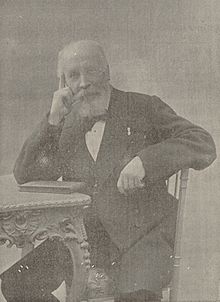Auguste Tolbecque
Auguste Tolbecque (born March 30, 1830 in Paris , † March 8, 1919 in Niort ) was a French cellist, conductor, composer, instrument maker and music teacher.
From the age of fifteen, Tolbecque attended the cello class at the Conservatoire de Paris , which he completed four years later as the winner of the First Prize. He worked in his parents-in-law's violin-making workshop in Niort before becoming professor of cello at the Conservatoire de Marseilles . In 1870 he returned to Paris and initially devoted himself to the reconstruction of historical musical instruments in Niort from 1875 onwards. He participated in the Paris World Exhibition in 1878 with a collection of reconstructed historical instruments that were later sold to the Brussels Instrument Museum.
From 1880 to 1887 he was orchestra leader of the Société Philharmonique de Niort . In addition, he continued to conduct research in the field of violin making and historical instruments and was in correspondence with collectors, violin makers and conservators such as Charles Mahillon , the curator of the Instrument Museum in Brussels. With the presentation of thirty-three instruments he won the Grand Prize at the Exposition Internationale du Théâtre et de la Musique in Paris in 1896. This collection later came into the possession of the Conservatoire de Paris.
Tolbecque published an autobiography under the title Souvenirs d'un musicien en province and in 1903 as a summary of his experiences as an instrument maker and restorer L'Art du luthier . Little was known of his compositions, they were seldom performed, and no recordings are available. The one-act operetta Après la valse based on a libretto by Henri Clouzot was shown in a private performance in Niort in 1894. Tolbecque was more successful as a violist and cellist; so in 1873 he played the world premiere of Camille Saint-Saëns ' First Cello Concerto. He also performed as an organist and pianist.
swell
- Alienor Conseil de musées - Auguste Tolbecque: portraits multiples d'un homme secret ...
- Center pour la Communication Scientifique Directe -Auguste Tolbecque et Eugène de Bricqueville: two organographes collectionneurs d'instruments anciens
- Ronny de Schepper: Auguste Tolbecque (1830-1919)
| personal data | |
|---|---|
| SURNAME | Tolbecque, Auguste |
| BRIEF DESCRIPTION | French cellist, conductor, composer, instrument maker and music teacher |
| DATE OF BIRTH | March 30, 1830 |
| PLACE OF BIRTH | Paris |
| DATE OF DEATH | March 8, 1919 |
| Place of death | Niort |
